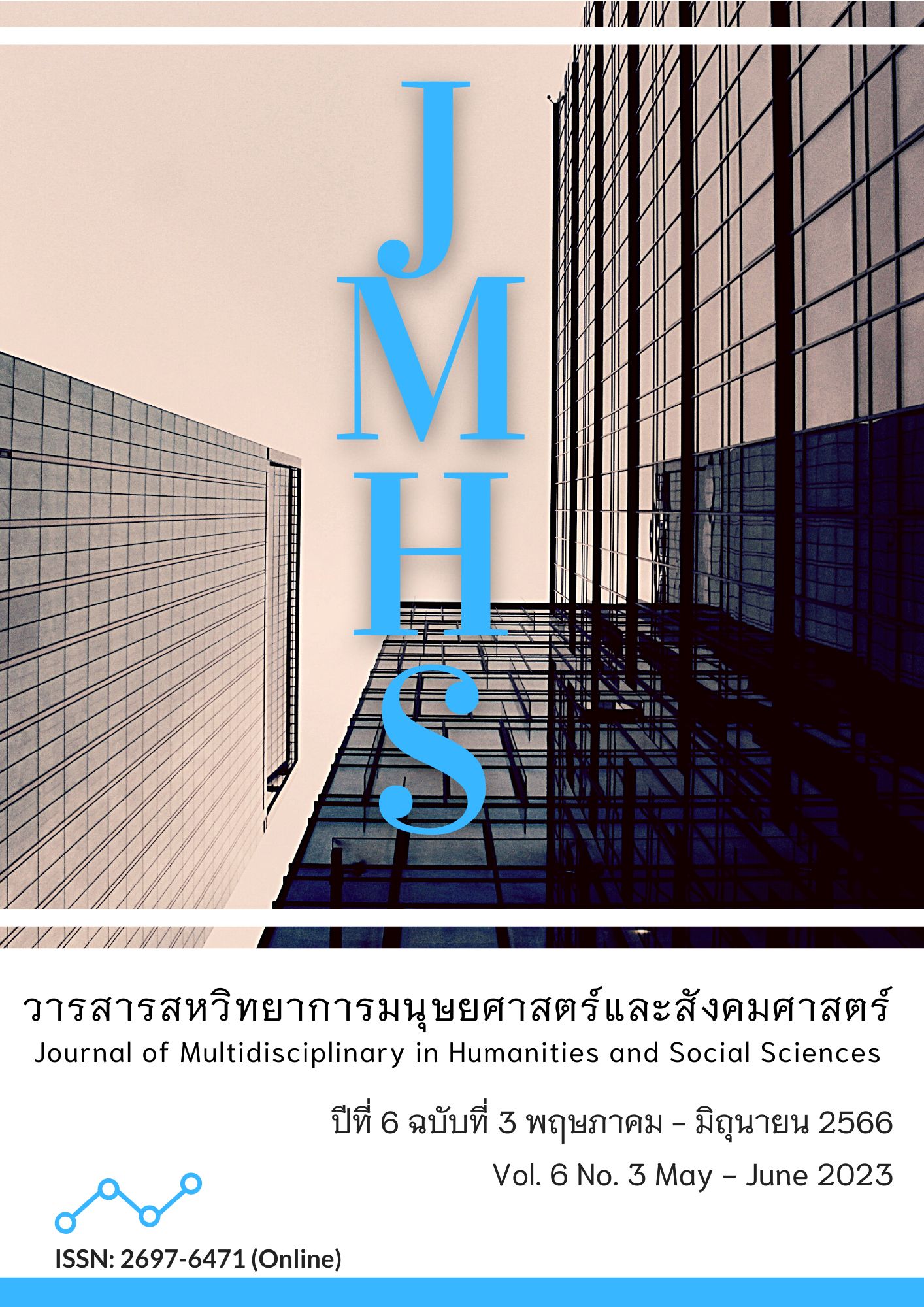Development of Learning Management Model based on Phenomenon-Based Learning and Thinking to Enhance Ethical Decision-Making Ability for Undergraduate Students of Kasetsart University
Main Article Content
Abstract
This article aimed to develop and study the effects of the development of a learning management model based on phenomenon-based learning and thinking to enhance ethical decision-making ability for undergraduate students at Kasetsart University. The research design was research and development. The research framework is based on phenomenon-based learning and thinking. The target group were 9 students of Kasetsart University who enrolled in the subject of Ethics and Code for Teachers’ Profession. The instruments for collecting data were composed of a treatment tool, that was, a lesson plan developed by a researcher, and a data collection tool, which consisted of 1) ethical decision-making ability tests. 2) Personal characteristics on the ethical decision-making ability assessment form; and 3) Ethical decision-making behavior assessment form. Analysis data by using percentages to analyze the level of ethics development.
The research results were found as follows: 1. The learning management model comprises four steps: 1) confronting a situation, 2) sharing ideas, 3) combining differences, and 4) creating a self-path. 2. The overall ethical decision-making ability aspects of the target group were increased. Individual ethical decision-making abilities of the target group were accelerated by 4, 5, and 6 learning units: 2, 5, and 2 persons, respectively. There was only one target group that decreased in 1 learning unit and also a learning unit in which the target group was unchanging and composed of learning units 1, 3, 5, and 7, 3, 8, 1, and 4 persons, respectively.
Article Details

This work is licensed under a Creative Commons Attribution-NonCommercial-NoDerivatives 4.0 International License.
Views and opinions appearing in the Journal it is the responsibility of the author of the article, and does not constitute the view and responsibility of the editorial team.
References
ฌลณัญ ธราพร ศิริรัตน์ ศรีสอาดและ อุดมลักษม์ กูลศรีโรจน์. (2561). การพัฒนากิจกรรมวิทยาศาสตร์ระดับประถมศึกษาเพื่อส่งเสริมทักษะการตัดสินใจโดยใช้ทฤษฎีการตัดสินใจอย่างมีเหตุผลของ Simon. วารสารศึกษาศาสตร์ มสธ., 11(2), 171-182. สืบค้นจาก https://so05.tci-thaijo.org/index.php/edjour_stou/article/view/162000/118454
ณัฐกิตติ์ นาทา. (2558). กลยุทธ์การสอนภาษาไทยในศตวรรษที่ 21 เพื่อพัฒนาทักษะการคิดขั้นสูง. วารสารศึกษาศาสตร์ มหาวิทยาลัยศิลปากร, 13(1), 57-69.
สืบค้นจาก https://so02.tci-thaijo.org/index.php/suedujournal/article/view/94896/74148
เดชา เดชะวัฒนะไพศาล. (2562). คิดก่อนคิด พัฒนาความคิด เปลี่ยนชีวิตให้ทันเกม. กรุงเทพฯ: จุฬาลงกรณ์มหาวิทยาลัย.
ตะวัน ไชยวรรณ และ กุลธิดา นุกูลธรรม. (2564). การจัดการเรียนรู้โดยใช้ปรากฏการณ์เป็นฐาน: การเรียนรู้แบบบูรณาการเพื่อส่งเสริมความรู้ของผู้เรียนในโลกแห่งความจริง. วารสารบัณฑิตศึกษา มหาวิทยาลัยราชภัฏวไลยอลงกรณ์ ในพระบรมราชูปถัมภ์, 15(2), 251-263. สืบค้นจาก https://so02.tci-thaijo.org/index.php/JournalGradVRU/article/view/246642/168 302
ธนัลภร สินพรพญา และ พระครูพิพิธสุตาทร. (2560). การตัดสินใจตามแนวทางทฤษฎีเกมและพระพุทธศาสนา. วารสารวิชาการมนุษยศาสตร์และสังคมศาสตร์, 25(47), 267-281. สืบค้นจาก https://so06.tci-thaijo.org/index.php/husojournal/article/view/76729/61656
บุญมี โททำ, เสาวลักษณ์ โกศลกิตติอัมพร และ สัญญา เคณาภูมิ. (2561). การสังเคราะห์กรอบแนวคิดเชิงทฤษฎีพฤติกรรมเชิงจริยธรรม. วารสารมนุษยศาสตร์และสังคมศาสตร์ มหาวิทยาลัยราชภัฏอุบลราชธานี, 9(2), 105-122. สืบค้นจาก https://so01.tci-thaijo.org/index.php/humanjubru/article/view/161061/116145
เบญญพร มหาพิรุณ, เรณู จันทะวงศา และ สุริยะ พุ่มเฉลิม. (2560). ตัวชี้วัดคุณธรรมจริยธรรมของบัณฑิต. Southeast Bangkok Journal, 3(2), 127-140. สืบค้นจาก https://so05.tci-thaijo.org/ index.php/SB_Journal/article/view/191543/133704
ประพรรธน์ พละชีวะ และคณะ. (2560). การใช้คอมพิวเตอร์สนับสนุนการเรียนร่วมกันเพื่อพัฒนาทักษะการคิดขั้นสูง. วารสารบัณฑิตศึกษา มหาวิทยาลัยราชภัฏวไลยอลงกรณ์ในพระบรมราชูปถัมภ์, 11(3), 246-258. สืบค้นจาก https://so02.tci-thaijo.org/index.php/ JournalGradVRU/article/view/108250/85644
พงศธร มหาวิจิตร. (2560). นวัตกรรมการเรียนรู้จากฟินแลนด์. นิตยสาร สสวท., 46(209), 40-45. สืบค้นจาก https://emagazine.ipst.ac.th/209/#40
มหาวิทยาลัยเกษตรศาสตร์. (2563, 24 มิถุนายน). วิสัยทัศน์และยุทธศาสตร์การพัฒนามหาวิทยาลัยเกษตรศาสตร์ ระยะ 12 ปี (พ.ศ. 2560 - 2571). สืบค้นเมื่อ 20 กุมภาพันธ์ 2566, จาก https://www.ku.ac.th/th/operation-plan-and-action-plan-of-ku/download/3126.
รัฐบุรุษ คุ้มทรัพย์. (2558). บทบาทของอาจารย์ในการส่งเสริมจริยธรรมแก่นักศึกษา. วารสารบัณฑิตศึกษา มหาวิทยาลัยราชภัฏสวนสุนันทา, 8(2), 1-12. สืบค้นจาก http://journalgrad. ssru.ac.th/index.php/issue14/article/view/365/395
วาสนา กีรติจำเริญ และ อิสรา พลนงค์. (2563). การเปรียบเทียบผลสัมฤทธิ์ทางการเรียนและทักษะการสื่อสารและการนำเสนอของนักศึกษาระดับปริญญาตรีโดยใช้วิธีการสอนแบบสืบเสาะหาความรู้ 5E กับวิธีการสอนโดยใช้ปรากฏการณ์เป็นฐาน. วารสารชุมชนวิจัย มหาวิทยาลัยราชภัฏนครราชสีมา, 14(1), 29-43. https://doi.org/10.14456/nrru-rdi.2020.3
วิรัช วรรณรัตน์. (2558). หลักและวิธีการสอบวัด. วารสารมนุษยศาสตร์และสังคมศาสตร์ มหาวิทยาลัยราชพฤกษ์, 1(2), 1-12. สืบค้นจาก https://so03.tci-thaijo.org/index.php/rpu/article/view/112334/87545
วีระพงษ์ พิมพ์สาร. (2562). การศึกษาไทยกับการประยุกต์ใช้ Phenomenon - Based Learning. นิตยสาร สสวท, 47(220), 46-50. สืบค้นจาก https://emagazine.ipst.ac.th/220/46/
วุฒิ ถนอมวิริยะกุล, ปริญญา ทองสอน และ สมศิริ สิงห์ลพ. (2562). การพัฒนารูปแบบการจัดการเรียนรู้วิทยาศาสตร์ เพื่อส่งเสริมการคิดอย่างมีวิจารณญาณ สำหรับนักเรียนชั้นประถมศึกษาปีที่ 6. วารสารศึกษาศาสตร์ มมร, 7(2), 509-524. สืบค้นจาก http://ojs.mbu.ac.th/index.php/ edj/article/view/529/434
สงวน อินทร์รักษ์. (2559). ทักษะการคิดที่มีประสิทธิภาพของผู้บริหารสถานศึกษา. วารสารจันทรเกษมสาร, 22(43), 17-31. สืบค้นจาก https://li01.tci-thaijo.org/index.php/crujournal/article/view/ 78261/62684
สนธิ พลชัยยา. (2557). สะเต็มศึกษากับการคิดขั้นสูง. นิตยสาร สสวท., 42(189), 7-10. สืบค้นจาก https://emagazine.ipst.ac.th/189/IPST189/assets/common/downloads/IPST189.pdf
สุเสารัจ ประพันธ์ศิริ. (2556). การพัฒนาการคิด. (พิมพ์ครั้งที่ 5). กรุงเทพฯ: 9119 เทคนิคพริ้นติ้ง.
โสรยา งามสนิท, ปรียา สมพืช และ นิศรารัตน์ วิไลลักษณ์. (2564). การติดตามผลกระบวนการมีส่วนร่วมในการผลิตสื่อเพื่อการเรียนรู้จริยธรรมวิชาชีพสื่อสารมวลชน.วารสาร มจร สังคมศาสตร์ปริทรรศน์, 10(3), 253-263. สืบค้นจาก https://so03.tci-thaijo.org/index.php/jssr/article/view/252102/170554
สำนักงาน ก.พ. (2555). คู่มือ: การพัฒนาและส่งเสริมการปฏิบัติตามมาตรฐานทางจริยธรรมข้าราชการพลเรือนสำหรับคณะกรรมการจริยธรรม. สืบค้นเมื่อ 22 กันยายน 2565, จาก https://www.ocsc.go.th/download/2555/คู่มือการพัฒนาและส่งเสริมการปฏิบัติตามมาตรฐานทางจริยธรรมข้าราชการพลเรือน.
สำนักงานปลัดกระทรวงศึกษาธิการ. (2565, สิงหาคม). รายงานผลการประเมินคุณธรรม จริยธรรมและความเป็นพลเมืองของผู้เรียนทุกช่วงชั้น ประจำปีงบประมาณ พ.ศ. 2565. สืบค้นเมื่อ 12 พฤษภาคม 2566, จาก https://www.moe.go.th/wp-content/uploads/2022/09/05.รายงานผลการประเมินคุณธรรม-จริยธรรม.pdf
สำนักงานสภาพัฒนาการเศรษฐกิจและสังคมแห่งชาติ. (2565, 24 ตุลาคม). แผนพัฒนาเศรษฐกิจและสังคมแห่งชาติ ฉบับที่ 13 (พ.ศ. 2566 – 2570). สืบค้นเมื่อ 20 กุมภาพันธ์ 2566, จาก https://www.nesdc.go.th/download/Plan13/Doc/Plan13_Final.pdf.
อรนันท์ หาญยุทธ. (2561). การตัดสินใจเชิงจริยธรรม: แนวคิดและการประยุกต์ใช้. วารสารพยาบาลทหารบก, 19(2), 111-119. สืบค้นจาก https://he01.tci-thaijo.org/index.php/JRTAN/article/view/143967/106508
อรพรรณ บุตรกตัญญู. (2561). การเรียนรู้โดยใช้ปรากฏการณ์เป็นฐานเพื่อการสร้างมุมมองแบบองค์รวมและการเข้าถึงโลกแห่งความจริงของผู้เรียน. วารสารครุศาสตร์ จุฬาลงกรณ์มหาวิทยาลัย, 46(2), 348-365. สืบค้นจาก https://so02.tci-thaijo.org/index.php/EDUCU/article/view/131909/99030
Akkas, E., & Eker, C. (2021). The Effect of Phenomenon-Based Learning Approach on Students' Metacognitive Awareness. Educational Research and Reviews, 16(5), 181-188. Retrieved from https://files.eric.ed.gov/fulltext/EJ1296934.pdf
Allen, M. (2004). Smart Thinking: Skills for Critical Understanding and Writing. (2nd ed.). New York: Oxford University Press.
Alvani S. M., & KarimiJahromi S. (2016). Ethical Decision Making in Issues Management. IOSR Journal of Humanities and Social Science (IOSR-JHSS), 21(7), 34-39. https://doi.org/10.9790/0837-2107043439
Ang, J. W. J., Huang, L. Q. H., & Ng, Y. N. A. (2022). Instagram as a Tool in Phenomenon-Based Learning: An Educational Design Research. Pupil: International Journal of Teaching, Education and Learning, 6(1), 322-341. https://doi.org/10.20319/pijtel.2022.61.322341
British Association for Counselling and Psychotherapy. (2018). Good Practice in Action 033 Research Overview: Ethical Decision Making Within the Counselling Professions. Leicestershire. England: British Association for Counselling and Psychotherapy.
Li, Y. M., & Luo, Y. F. (2022). The Influencing Factors of Clinical Nurses’ Problem-Solving Dilemma: A Qualitative Study. International Journal of Qualitative Studies on Health and Well-being, 17(1), 1-7. https://doi.org/10.1080/17482631.2022.2122138
March, D., Díaz Pérez, W., & Escárzaga Morales, M. (2019). Enhancing Language Awareness and Competence-building through a Fusion of Phenomenon-based Learning and Content and Language Integration. Journal of e-Learning and Knowledge Society, 15(1), 55-65. Retrieved from https://www.je-lks.org/ojs/index.php/Je-LKS_EN/issue/view/130/2
Morrison, R. G., & Holyoak, K. J. (2005). Thinking and Reasoning: A Reader’s Guide. In Morrison, R. G. & Holyoak, K. J. (ed). The Cambridge Handbook of Thinking and Reasoning. New York: Cambridge University Press.
Nurdianawati, D., & Rachmawati, R. (2020). The Effect of Moral Intensity, Ethical Decision Making, Professional Commitment, and Anticipatory Socialization on Whistleblowing Intention. Advances in Economics, Business and Management Research, 132, 195-201. https://doi.org/10.2991/aebmr.k.200331.043
Patterson, R. (2006). Connecting Ethics to Action: An Introduction to Ethical Decision Making. The Christian Librarian, 49(1), 1-8. https://doi.org/10.55221/2572-7478.1694
World Health Organization. (1997). Life Skills Education in Schools. Geneva: WHO.


